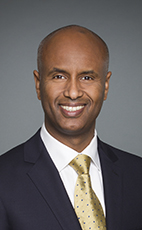From refugee to cabinet member: Canada’s new Minister of Immigration
By Stephen Fogarty • January 11, 2017
 Canada’s new Minister of Immigration, Refugees and Citizenship, is the Honourable Ahmed Hussen, the Member of Parliament for York South-Weston, in Ontario. He was sworn into office on January 10, 2017.
Canada’s new Minister of Immigration, Refugees and Citizenship, is the Honourable Ahmed Hussen, the Member of Parliament for York South-Weston, in Ontario. He was sworn into office on January 10, 2017.
Mr. Hussen arrived in Canada as a teenage refugee from Somalia, via Kenya, in 1993. A lawyer and social activist, Mr. Hussen served on several community organizations, including having founded the Toronto Regent Park Community Council in 2002, dedicated to improving low-cost housing facilities in his neighborhood, and most notably, as National President of the Canadian Somali Congress, prior to his election to Parliament in 2015.
In addition to English, the new Minister is fluent in Somali and Swahili. He holds a Bachelor of Arts in History from York University and a Bachelor of Laws from the University of Ottawa. Following his call to the bar in Ontario, Mr. Hussen practiced in the areas of criminal law, immigration, refugee and human rights law. As an M.P., he has been Vice-Chair of the Canada-Africa Parliamentary Association, a member of the Justice and Human Rights Committee of the House of Commons, and a member of other parliamentary associations.
Mr. Hussen’s predecessor as Minister, the Honourable John McCallum, spearheaded Bill C-6 to reform the Citizenship Act of Canada, currently making its way through the Senate, likely to become law by spring 2017, and important improvements in processing of family sponsorships, to cut processing times in half, and, modification of some unreasonable features of the Express Entry system for skilled workers. Mr. McCallum also gained respect in his handling of the Trudeau government’s pledge to welcome 25,000 Syrian refugees to Canada. This was quite an accomplishment for only 14 months as Minister.
The new Minister will now have to face the next major issue to be resolved: what is to be done with Canada’s business immigration categories? Canada’s federal investor and entrepreneur programs have been dormant many months, pending review, while the self-employed class has proven an unpopular choice as potential immigrants and their lawyers have been fearful that program might be suspended at any moment.
Likely Mr. Hussen will face pressure from anti-business and “anti-globalization” groups opposing the revitalization of business immigration, characterizing it as unfair, undemocratic, and a way for the “elite” to “buy their way into Canada”. It is hoped that Mr. Hussen will seek a broader approach to these issues, keeping at the forefront our country’s need to bolster the economy in the years ahead, in part by attracting persons with managerial experience, business talent and the financial resources to create profitable enterprises to employ workers and pay taxes in Canada. If he does so, the new Minister will be able to make a significant impact on the immigration laws of his adopted country.
Photo credit: Parliament of Canada website